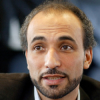Tariq Ramadan

Tariq Ramadan
Tariq Ramadanis a Swiss academic, philosopher and writer. He is the professor of Contemporary Islamic Studies in the Faculty of Oriental Studies at St Antony's College, Oxford and also teaches at the Oxford Faculty of Theology. He is a visiting professor at the Faculty of Islamic Studies, the Université Mundiapolisand several other universities around world. He is also a senior research fellow at Doshisha University. He is the director of the Research Centre of Islamic Legislation and Ethics, based in...
NationalitySwiss
ProfessionWriter
Date of Birth26 August 1962
CountrySwitzerland
In the name of the rule of law, democracy and human rights, we cannot accept that the rights of individuals (Arab or Muslim) be trampled upon, or that populations are targeted and discriminated against in the name of the war against terrorism.
Destroying the nation state are mainly three things: the global economy, global communication technology and global culture. And this is where we are lost in the process. What could be something that can provide us a transversal political sense of belonging? At the end of the day, without an alternative we end up with populism in the name of very narrow identities.
Muslims must speak out and explain who they are, what they believe in, what they stand for, what is the meaning of their life. They must have the courage to denounce what is said and done by certain Muslims in the name of their religion.
Islam came to teach us that there is no faith without intelligence and here we are: destroying our intelligence in the name of faith.
Humility is my table, respect is my garment, empathy is my food and curiosity is my drink. As for love, it has a thousand names and is by my side at every window.
I've never suffered because of my heritage in Europe.
While criticism of Israel is legitimate and justifiable, it cannot be an excuse - in any way, shape or form - for anti-Semitism.
Many U.S. organizations believe that I am being barred from the country not because of my actions but because of my ideas. The conclusion seems inescapable.
We've got to get away from the idea that scholars in the Islamic world can do our thinking for us. We need to start thinking for ourselves.
We all cherish freedom of speech, but with a reasonable approach and a reasonable use of it. If we come to this, it is a debate. If not, then it is a power struggle. Who is going to win, the Muslim principles or the Western principles?
It's clear there is nothing in my record supporting terrorism.
The 'army camp' that coordinates the agencies of our brain is vulnerable, both in itself and from within. In effect, he who can know and master its functioning and psychology from outside can become twice its master.
Instantaneous and mass communication is the mother of mass naivety. Should we then lose hope? Is there any hope? But to lose hope is as dangerous as to nurture false hope. Where then can we find hope that is responsible?
The young people who join extremist groups are clearly suffering from massive deficiencies in religious knowledge and are often politically gullible (when they are not attempting to salve pangs of conscience by cutting themselves off from a life of delinquency).